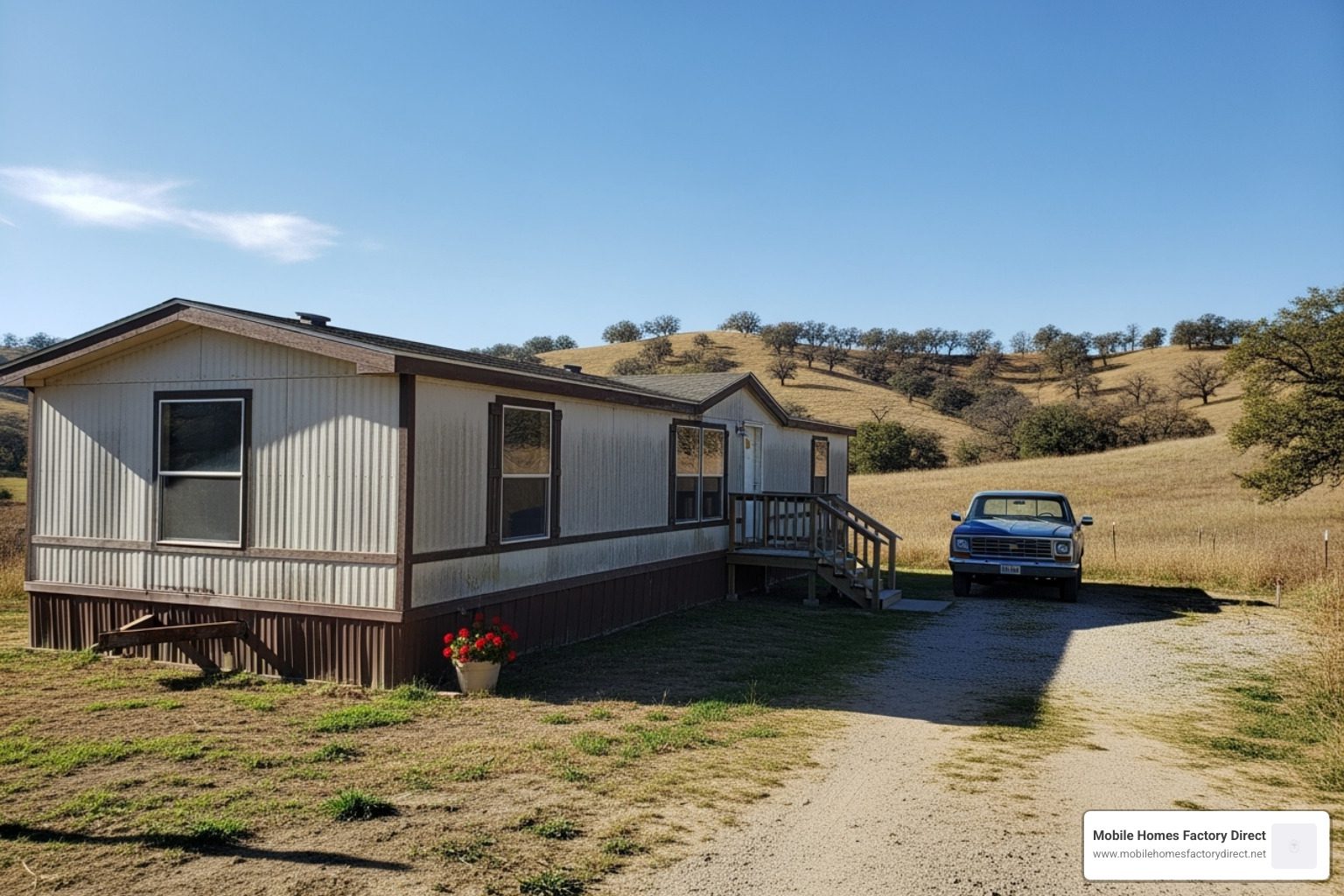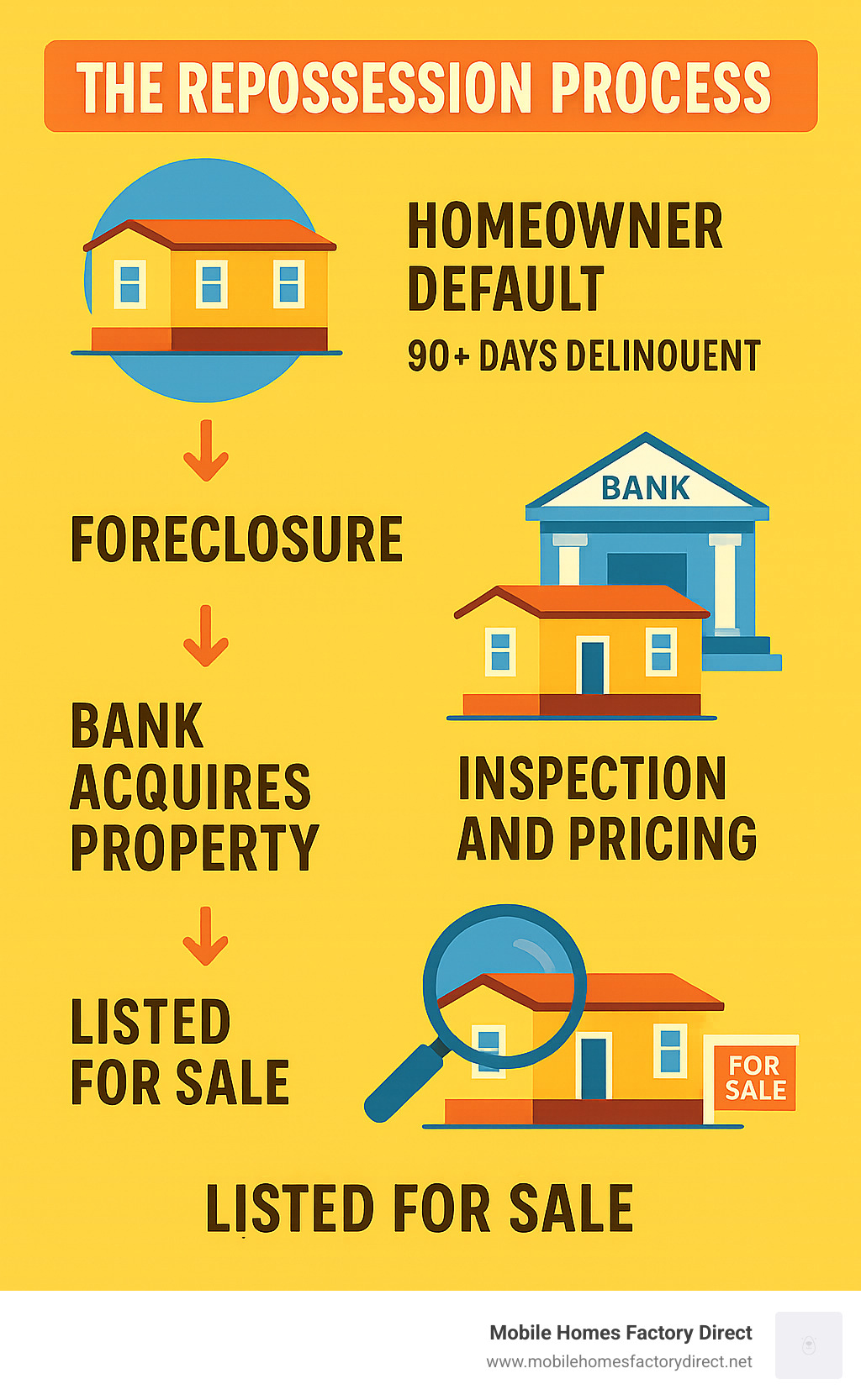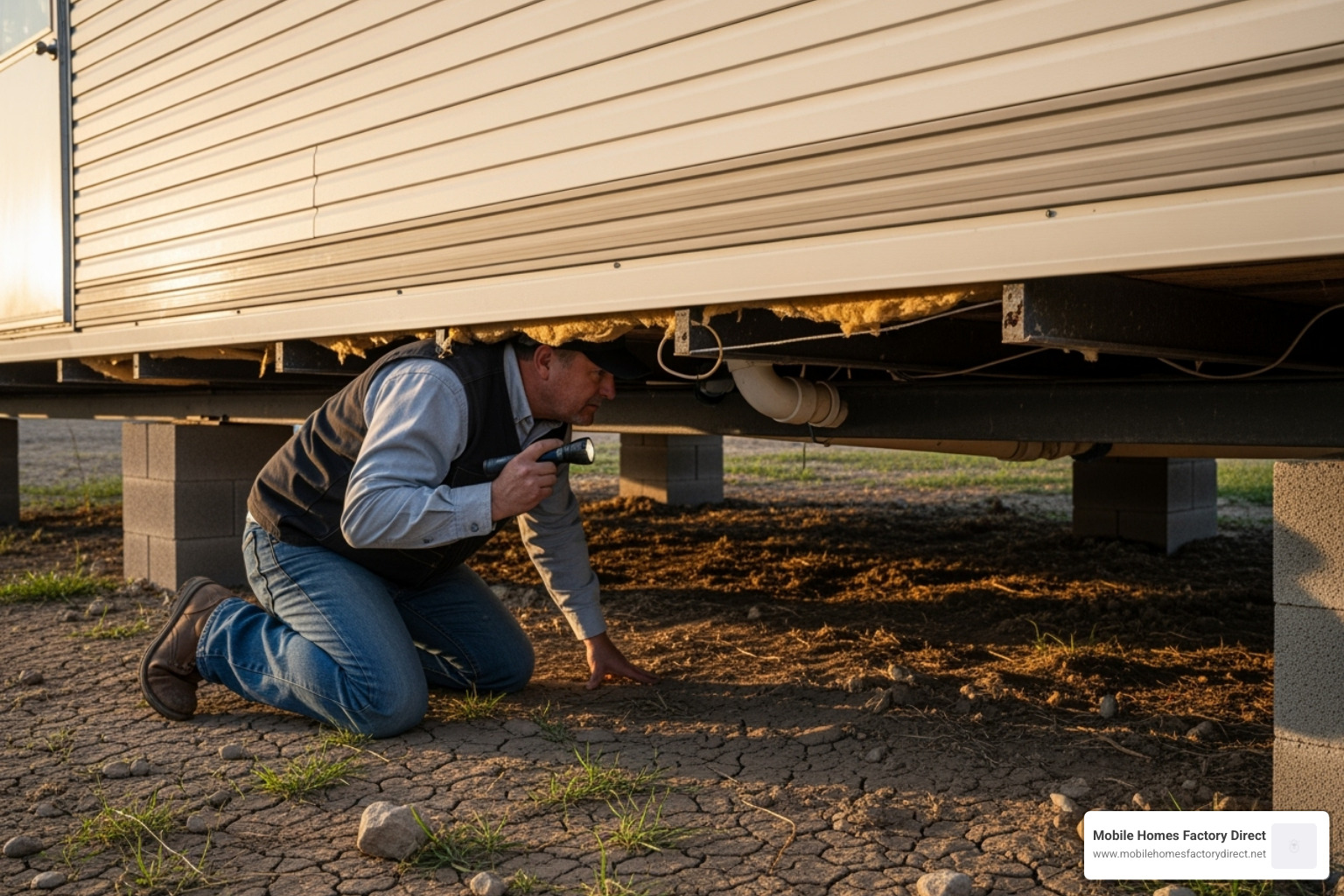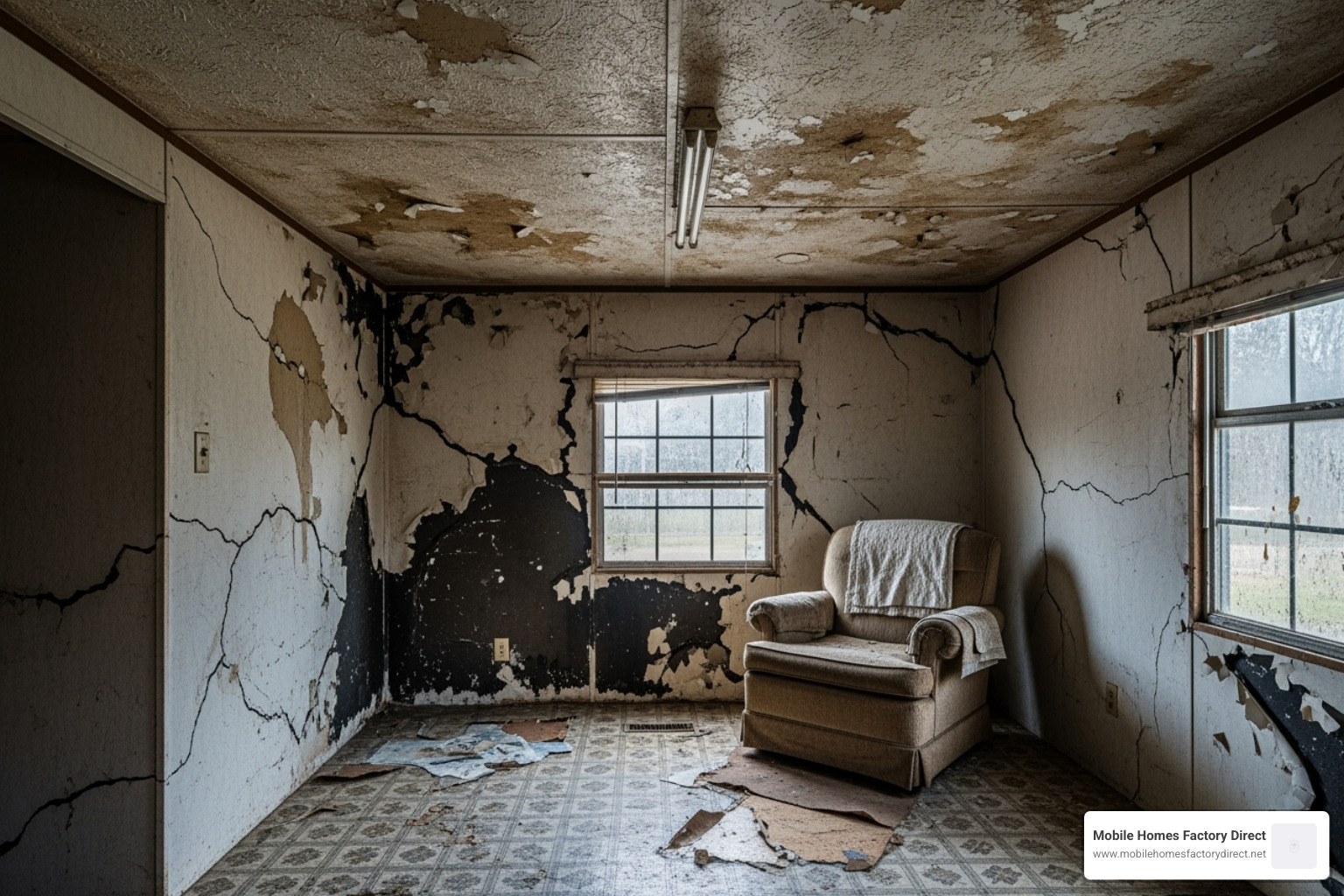Repo Single Wides: Great Deals on Compact Homes
Unlock affordable homeownership! Learn to find, inspect, finance, and buy repossessed single wide mobile homes for great savings.
Your Path to Affordable Homeownership
Repossessed single wide mobile homes offer one of the most accessible routes to homeownership for budget-conscious buyers. These compact homes, reclaimed by lenders due to payment defaults, are typically sold at significant discounts to help financial institutions recover their losses quickly.
Quick Answer for Buyers:
- Savings: 20-40% below market value
- Size: Typically 600-1,200 square feet
- Cost Range: $25,000-$60,000 depending on age and condition
- Financing: Available even with challenged credit
- Where to Find: Bank REO listings, specialized dealers, online marketplaces
- Key Risk: Sold “as-is” – inspection is critical
Banks and lenders are motivated sellers when it comes to repo properties. They want to clear these homes from their books as quickly as possible, which creates real opportunities for buyers who know what to look for.
A repossessed single wide mobile home is a manufactured home built on a permanent chassis, typically 14-18 feet wide and 60-80 feet long. When the original owner defaults on their loan, the lender takes possession and puts it back on the market – often at a steep discount.
The appeal is clear: you can potentially buy a home for what others pay as a down payment on new construction. But like any deal that seems too good to be true, repo single wides require careful evaluation and smart buying strategies.
The Pros and Cons of Buying a Repo Single Wide
When you’re looking at repossessed single wide mobile homes, you’re essentially shopping for someone else’s lost dream – and that can become your incredible opportunity. These homes end up back in the bank’s hands when the previous owner couldn’t keep up with payments, and now the lender just wants them gone.
Here’s the thing about banks and repo properties: they’re not in the housing business, they’re in the money business. That means they’re motivated to sell quickly, often at prices that would make your jaw drop. We’re talking about potential savings that can turn homeownership from a distant dream into next month’s reality.
But let’s be honest – if it sounds too good to be true, you need to dig deeper. Repossessed single wide mobile homes come with both amazing opportunities and real risks. The key is knowing what you’re getting into before you sign on the dotted line.
For a complete breakdown of what to expect, check out our detailed guide on the Pros and Cons of Buying Repossessed Mobile Homes.
The Appeal of Repossessed Single Wide Mobile Homes for Savvy Buyers
The numbers alone will get your attention. Repossessed single wide mobile homes typically sell at 20-40% below market value. Think about that for a moment – you could be paying less for an entire home than most people put down as a deposit on new construction.
This kind of significant discount happens because lenders want these properties off their books fast. Every month they hold onto a repo home, they’re losing money on maintenance, insurance, and storage costs. Your urgency becomes their motivation to deal.
But the savings are just the beginning. When you buy significantly below market value, you’re building equity from day one. While your neighbors might be underwater on their mortgages for years, you could already have substantial equity before you even move in.
The lower entry cost makes homeownership possible for people who thought they’d be renting forever. Instead of scraping together a 20% down payment on a $200,000 house, you might be able to buy a repo single wide outright for $40,000 or less.
There’s also incredible negotiation flexibility when dealing with institutional sellers. Unlike homeowners who have emotional attachments to their property, banks look at these homes as numbers on a spreadsheet. They want reasonable offers that help them clear inventory quickly.
Plus, the money you save upfront gives you customization opportunities that wouldn’t be possible with a traditional purchase. You can invest in upgrades, renovations, or improvements that truly make the space your own.
For investors, repo single wides offer investment potential that’s hard to find elsewhere. Whether you’re looking to flip, rent, or hold for appreciation, starting with a property purchased well below market value gives you multiple exit strategies.
Want to understand more about why repo mobile homes make such smart purchases? Our article Why Should You Get a Repo Mobile Home breaks down all the advantages.
Potential Risks and How to Mitigate Them
Now for the reality check. Repossessed single wide mobile homes are sold “as-is,” which is lender-speak for “what you see is what you get, problems and all.”
The previous owner might have been struggling financially for months or even years before the repossession. During that time, maintenance probably wasn’t a priority. You could be looking at deferred repairs, neglected systems, or even hidden damage that isn’t obvious during a casual walkthrough.
Title issues can also complicate repo purchases. Sometimes there are outstanding liens, unclear ownership history, or problems with the repossession process itself. These legal claims might seem like someone else’s problem until they become yours.
Financing challenges add another layer of complexity. Some repo homes won’t qualify for traditional mortgages due to their condition, age, or classification. You might need to explore chattel loans, personal loans, or cash purchases.
Here’s how to protect yourself: Never skip the professional inspection. We can’t stress this enough. A few hundred dollars spent on a qualified inspector can save you thousands in surprise repairs. Look for someone who specializes in manufactured homes and understands their unique systems and potential problems.
Pay special attention to signs of water damage, foundation issues, and major system problems. Check for signs of water damage throughout the home, as water issues can be expensive and ongoing.
Do your due diligence on the title and legal history. Work with professionals who understand repo sales and can verify that everything is legitimate and properly documented.
For financing, be prepared to explore multiple options. The money you save on purchase price might offset higher interest rates or different loan terms.
The bottom line? Repo single wides can be incredible deals, but they require careful evaluation and realistic expectations. When you do your homework and work with experienced professionals, the risks become manageable and the rewards can be substantial.
For more detailed guidance on navigating these challenges, our comprehensive guide on Repossessed Mobile Homes covers everything you need to know.
The Ultimate Guide to Buying Repossessed Single Wide Mobile Homes
Ready to turn your homeownership dreams into reality? Let’s walk through the entire journey of buying a repossessed single wide mobile home, from your first search to holding those keys in your hand. Think of this as your roadmap to finding an incredible deal on a home that could be perfect for you.
The buying process might seem overwhelming at first, but we’ve helped countless families steer this path successfully. With the right approach and some insider knowledge, you’ll be amazed at the opportunities available in the repo market.
Where to Find Repo Single Wides for Sale
Finding repossessed single wide mobile homes is like finding hidden treasure – you just need to know where to look. The good news is that motivated sellers (usually banks) want these homes sold quickly, which means deals are out there waiting for savvy buyers like you.
Bank REO listings are often your best starting point. When banks take back properties, they create Real Estate Owned (REO) portfolios that need to be cleared. Most major banks have dedicated sections on their websites listing foreclosures and bank-owned homes. Look for terms like “REO properties” or “bank-owned homes” in their real estate sections.
Specialized dealers like Mobile Homes Factory Direct offer a significant advantage in your search. We maintain relationships with lenders and often have exclusive access to repo inventory before it hits the general market. Plus, we understand the ins and outs of the process and can guide you through potential pitfalls that first-time buyers might miss.
Online marketplaces dedicated to manufactured homes aggregate listings from multiple sources, making your search more efficient. These platforms often have specific filters for repo or foreclosure properties, helping you narrow down your options quickly. The key is checking these sites regularly since good deals move fast.
Foreclosure auctions can offer incredible prices, but they come with higher risks. You’ll typically need cash payment and won’t have the chance to inspect the home beforehand. If you’re comfortable with uncertainty and have cash available, auctions can yield amazing deals.
Government agencies like HUD, VA, and other federal entities sometimes have repossessed properties available. These sales may come with specific conditions or income requirements, but they’re worth exploring if you qualify.
Don’t overlook local opportunities either. Real estate agents who specialize in distressed properties, community bulletin boards in mobile home parks, and even driving through neighborhoods can uncover deals that haven’t made it to online listings yet.
To get started right away, check out our guide on Find Repo Mobile Homes For Sale Near Me. You can also browse our current inventory of Used Single Wide Mobile Homes For Sale to see what’s available in your area.
The Critical Inspection Checklist
Here’s where the rubber meets the road – literally. Your inspection is the make-or-break moment that determines whether you’re getting an amazing deal or walking into a money pit. Since repossessed single wide mobile homes are sold “as-is,” this step is absolutely critical.
We strongly recommend hiring a professional inspector who specializes in manufactured homes. They know exactly what to look for and can spot issues that untrained eyes might miss. A few hundred dollars for an inspection can save you thousands in unexpected repairs.
Structural integrity should be your first concern. Walk every inch of the floors, feeling for soft spots, excessive bounce, or unevenness that could indicate water damage or subfloor problems. Check walls and ceilings for cracks, bowing, or water stains. If possible, get underneath the home to inspect the steel frame for rust, bends, or cracks in the chassis and outriggers.
Foundation and support systems need careful attention, especially if the home is already set up on a site. Look for level, stable piers and blocks, proper anchoring, and signs of shifting or settlement that could cause future problems.
The roof and exterior tell the story of how well the home has been maintained. Missing shingles, tears, pooling water, or damaged flashing around vents can lead to expensive repairs. Examine the siding for cracks, holes, or buckling that might compromise the home’s protection from the elements.
Plumbing systems require thorough testing. Turn on every faucet, flush toilets, and check water pressure throughout the home. Look for signs of water damage around sinks, tubs, and the water heater. Inspect visible pipes for leaks, corrosion, or freeze damage.
Electrical systems can be dangerous if compromised. Test all outlets and switches, inspect the electrical panel for proper labeling and signs of corrosion, and watch for any exposed wires or obvious fire hazards.
Don’t forget to verify the HUD tag – that red certification label on the exterior of each home section. Inside, usually near the electrical panel, you’ll find the data plate with crucial information like manufacturer details, build date, and serial number. This documentation is essential for legal relocation and financing.
HVAC systems and major appliances should be tested if they’re included in the sale. A non-functioning furnace or air conditioner can add thousands to your move-in costs.
Making an Offer and Closing the Deal
Found the perfect repossessed single wide mobile home that passes inspection? Now comes the exciting part – making it yours. This phase requires some strategy, but banks are motivated sellers who want to close deals quickly.
Research is your secret weapon before making any offer. Look at comparable single wide homes in the area, considering age, size, condition, and location. Factor in the “as-is” condition and any repairs you’ve identified during inspection. This homework gives you confidence in your offer and negotiating power.
Your written offer should be clear and professional, stating your proposed purchase price, any contingencies you need, and your preferred closing timeline. Banks typically require earnest money (usually $500-$2,000) to show you’re serious about the purchase.
Negotiation with banks is often more straightforward than dealing with emotional private sellers. They’re focused on recovering their losses, not getting top dollar. If your inspection uncovered issues, use that professional report as leverage to negotiate a lower price or request specific repairs.
Smart contingencies protect your investment. Include a financing contingency so you can back out if you can’t secure a loan. An inspection contingency gives you room to renegotiate if major problems surface. If the home needs to be moved, add a delivery and setup contingency to ensure you have a viable relocation plan.
Title work is crucial for repo properties where ownership history can be complicated. A thorough title search verifies the bank has clear ownership and no outstanding liens exist. Title insurance protects you from future claims – it’s worth every penny for peace of mind.
The closing process brings everything together. You’ll sign loan documents, pay closing costs (typically 3-6% of the loan amount), and receive your ownership papers. Make sure you get a clear bill of sale and properly transferred title.
If you’re planning to relocate the home, you’ll need transportation permits and local installation permits. The paperwork might seem overwhelming, but working with experienced professionals like our team at Mobile Homes Factory Direct can streamline the entire process and ensure nothing falls through the cracks.
The key to success is preparation and having the right team on your side. With careful planning and professional guidance, buying a repo single wide can be one of the smartest financial moves you’ll ever make.
Navigating Financing and Legal Requirements
Securing your repossessed single wide mobile home involves more than just finding the perfect deal – understanding the financial and legal landscape is equally crucial. We’re here to help you steer these often-complex waters with confidence.
The financing world for mobile homes can feel like a maze at first, but don’t worry – there are more options available than you might think. Even if your credit isn’t perfect, you can still find a path to homeownership through repossessed single wide mobile homes.
Financing Your Repossessed Single Wide Mobile Homes Purchase
Getting financing for a repossessed mobile home is different from buying a traditional house, but that doesn’t mean it’s impossible. In fact, we’ve helped countless buyers with all kinds of credit situations find the right financing solution.
| Financing Option | Min Credit Score | Typical Rate | Typical Terms | Key Features |
|---|---|---|---|---|
| Chattel Loans | 580+ | 7-12% | 15-20 years | Personal property loan, easier approval |
| FHA Loans | 580+ | 3.5-6% | 15-30 years | Must meet HUD standards, permanent foundation required |
| VA Loans | No minimum | 3-5% | 15-30 years | For qualified veterans, excellent terms |
| Conventional | 620+ | 4-8% | 15-30 years | Best rates, strict requirements |
| Bad Credit Specialty | 500+ | 8-15% | 10-20 years | Higher rates but accessible |
Chattel loans are often your best friend when buying a repo mobile home. These treat your home as personal property rather than real estate, which means faster approvals and less paperwork. The trade-off is typically higher interest rates and shorter terms, but for many buyers, it’s the most realistic path forward.
FHA loans can offer fantastic rates, but there’s a catch – the home must meet strict HUD standards and usually needs to be on a permanent foundation. Many repo homes need some work before they qualify, but the savings can make it worthwhile.
For our veterans, VA loans are an incredible benefit. If you qualify, you can often get the best rates available with no down payment required. The home still needs to meet VA standards, but we’ve seen veterans save thousands by taking advantage of this program.
If your credit has seen better days, don’t lose hope. We work with lenders who specialize in Financing For Mobile Homes With Bad Credit. These programs understand that life happens, and a past financial bump doesn’t mean you don’t deserve a home.
Down payment requirements vary widely. Chattel loans might ask for 5-20% down, while government programs like FHA can go as low as 3.5%. Some specialty lenders work with even less, especially if you’re buying significantly below market value.
Your credit score matters, but it’s not everything. We’ve seen buyers with scores in the 500s get approved, though they’ll pay higher rates. The key is being honest about your situation and working with lenders who understand mobile home financing.
For a complete breakdown of your options, check out our guide on Loan Options For Mobile Homes. We’ll help you understand which path makes the most sense for your specific situation.
Understanding the Legal Side
The legal aspects of buying repossessed single wide mobile homes can feel overwhelming, but understanding the basics will protect you from costly mistakes down the road.
Clear title is absolutely critical. Unlike traditional real estate, mobile homes have titles similar to cars. The bank must have a clear, marketable title to sell you the home legally. If there are any clouds on the title – like unpaid loans or disputed ownership – they become your problem after closing.
Liens are another concern. Previous owners might have taken out additional loans against the home, or there could be unpaid property taxes, utility bills, or even contractor liens. A thorough title search will uncover these issues before you buy, not after.
Property classification affects everything from financing to taxes. Is your home classified as real property (attached to land with a permanent foundation) or personal property (like a car)? This classification impacts which loans you can get and how you’ll be taxed.
State regulations vary significantly. Some states have strict rules about moving mobile homes, while others are more relaxed. If you’re planning to relocate your repo home, research the requirements early. You might need special permits, inspections, or even escorts for the move.
Understanding repossession law helps you verify that the bank’s ownership is legitimate. The previous owner had to be properly notified, given chances to cure the default, and the repossession had to follow state law. While rare, improper repossessions can create legal headaches for new buyers.
Finally, your bill of sale should be detailed and accurate. It should include the home’s serial number, year, make, model, and any included appliances or fixtures. This document proves what you bought and for how much – essential for insurance, taxes, and future resale.
Working with experienced professionals who understand mobile home law isn’t just smart – it’s essential. We’ve seen too many buyers try to steer these waters alone, only to find costly problems later. Let us help you get it right the first time.






